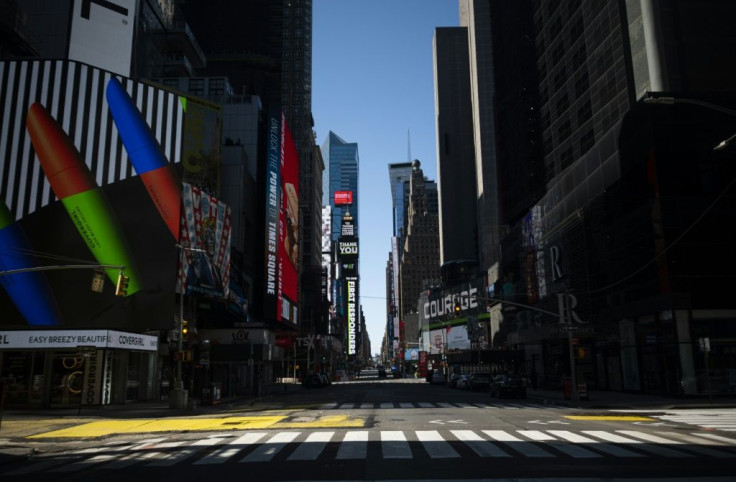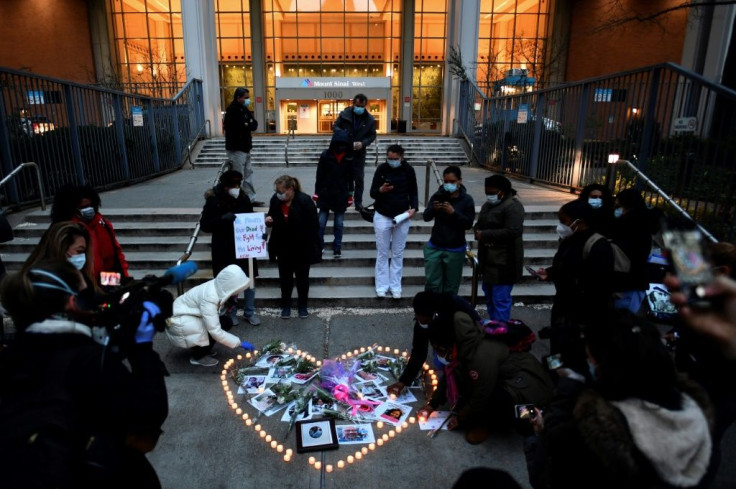Coronavirus US Death Toll Is Highest In The World At 22,105; New York City Is Top 5

KEY POINTS
- The U.S. now has more than 500,000 confirmed COVID-19 cases, the largest such number in the world
- It also has more than 22,000 deaths, the highest death toll in the world
- Dr. Fauci admits more Americans might still be alive had the government responded faster to social distancing recommendations
The United States over the weekend attained two horrific milestones in its fight against COVID-19 tearing through all 50 states and U.S. territories. On Friday, the U.S. became the first and only country to report more than 500,000 confirmed COVID-19 cases.
This milestone (502,876 cases) likely occurred before 6:00 p.m. Eastern Time on April 10, based on Worldometer data. Almost 24 hours later, or on April 11, the U.S. became the country with the largest number of coronavirus deaths in the world. It reported 20,460 deaths.
This toll has since increased to 22,105, as of 8:40 p.m. ET on Easter Sunday, along with 560,402 confirmed cases. Italy, which formerly led the world in the number of deaths, reported 19,899 total fatalities Sunday.
New York State accounts for 189,415, or 34%, of total U.S. COVID-19 cases and is, by far, the hardest hit state in the union. If New York State were a separate country, it would be the world's second most infected country after the United States. Spain, which is now the second most infected country, has 166,127 cases.
Almost 1% of New York State's total population of 19.4 million is now confirmed victims of COVID-19. The number of asymptomatic, or "silent carriers" might be as high as 30% of total infections by one estimate.
Official state data shows 188,694 confirmed cases as of Sunday along with 9,385 deaths. Of this dreadful total, New York City accounts for 103,208 cases and 6,898 deaths. NYC is responsible for 55% of all cases statewide, as well as 74% of all deaths.
Last Friday, New York governor Andrew Cuomo reported a drop in the number of COVID-19 patients in intensive care units (ICUs) across the state, offering a glimmer of hope the continuing jump in ICU cases might be leveling-off. He said there were 17 fewer patients in the ICUs on Thursday compared to Wednesday. Cuomo revealed this was the first time this number had fallen day-to-day since the state first confirmed a COVID-19 case on March 1.
“What we do will affect, literally, life and death for hundreds of people,” said Cuomo said during a media briefing. He noted that state health officials are“cautiously optimistic” because of the lowering of some hospitalization trends.
“Keep doing what we’re doing. Stay home because that works. We are flattening the curve,” he said.

On Sunday, Dr. Anthony Fauci, Director of the National Institute of Allergy and Infectious Diseases (NIAID), publicly declared more Americans might now be alive had the government responded faster to the recommendations of health experts that wanted to implement social distancing guidelines. Trump only ordered social distancing in mid-March, or three weeks after the country's top health experts first gave their advice.
Speaking on CNN's "State of the Union," Dr. Fauci said a different response timeline might have saved lives.
"I mean, obviously, you could logically say that if you had a process that was ongoing and you started mitigation earlier, you could have saved lives," said Dr. Fauci. He responded to a question by Jake Tapper, who asked if social distancing and stay-at-home measures could have prevented deaths had they been put in place in February, instead of mid-March.
"Obviously, no one is going to deny that. But what goes into those decisions is complicated," according to Dr. Fauci. "But you're right, I mean, obviously, if we had right from the very beginning shut everything down, it may have been a little bit different. But there was a lot of pushback about shutting things down back then."
He did, however, admit the process leading up to this point was "complicated."
"Obviously you could logically say that if you had a process that was ongoing and you started mitigation earlier, you could have saved lives," said Dr. Fauci. "Obviously, no one is going to deny that. But what goes into those kinds of decisions is complicated."
© Copyright IBTimes 2024. All rights reserved.





















